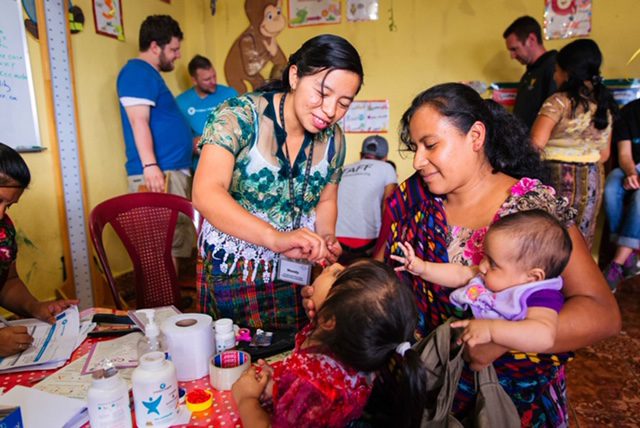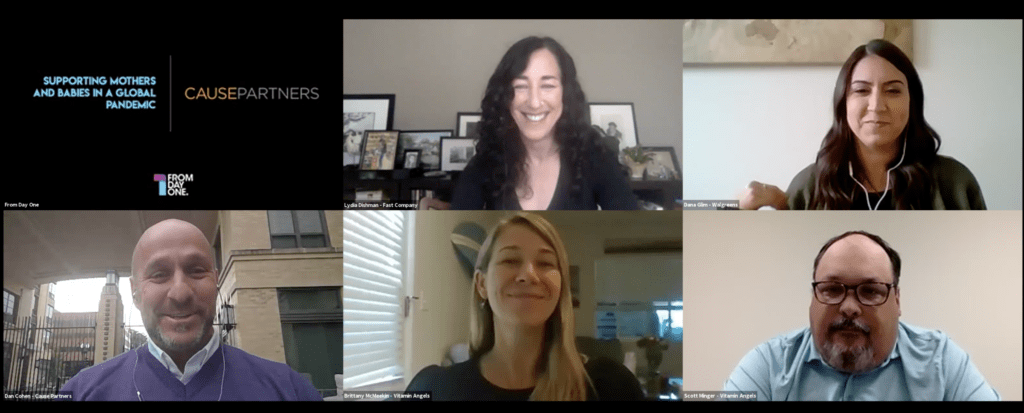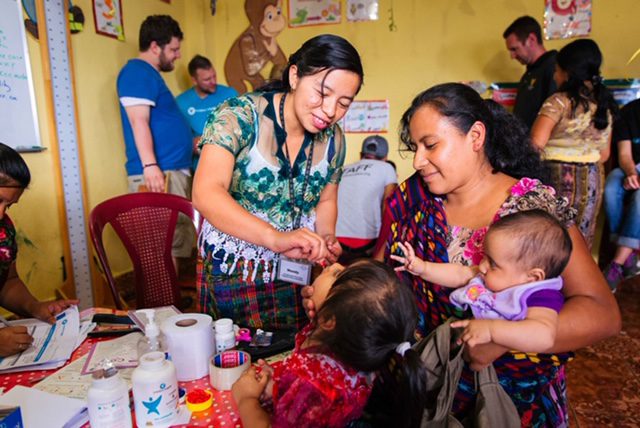In 2013, Walgreens launched a 30-day program with a simple concept: when you purchased vitamins from a select end-stand display inside its stores, a donation would be made to Vitamin Angels, a global public-health and nutrition organization dedicated to improving health for nutritionally vulnerable pregnant women and children.

Seven years later, the Walgreens and Vitamin Angels partnership is a permanent fixture of stores and has reached more than 250 million lives. Vitamins Angels recently joined Walgreens Boots Alliance as well, meaning the fundraising partnership will be launched in several new countries. “One of the biggest benefits of this partnership is the impact we can have together,” said Dana Glim, director of brand marketing for Walgreens.
Glim joined a From Day One panel that convened experts across corporate social responsibility, brand management, brand marketing and corporate citizenship. The topic at hand was supporting mothers and babies in the midst of a global pandemic and how the Walgreens and Vitamin Angels partnership has not only grown but is meeting the changing needs of vulnerable mothers during COVID-19.
The panel opened with a slideshow led by Brittany McMeekin, associate director of business development at Vitamin Angels. McMeekin outlined the drivers behind malnutrition and undernutrition and how it harms children in their developmental years. With COVID-19, she said, “We’ve seen declines in access to child health and nutrition services, disruptions to food supply chains, loss of jobs. And food insecurity is expected to nearly double by the end of this year. All of this has severe implications for child malnutrition rates.”
Vitamin Angels serves women in all 50 U.S. states and more than 70 countries, so it adapts to that need differently across the world. “Accessibility and affordability are the areas we’re really focused on,” explained Scott Minger, SVP of business development at Vitamin Angels. He added that the organization offers one of the lowest-cost, highest-impact services when it comes to global malnutrition. The cost to reach a child with life-changing nutrients through its Vitamin A Program is 25¢.

Vitamin Angels operates alongside corporate partners, with Walgreens being one of the most significant. “As a health-care company, it makes a lot of sense as we are trying to improve the health of communities,” said Glim. But she noted the company isn’t best suited to identify where the need is greatest and how those vulnerable communities should be served. “Therefore, the partnership with Vitamin Angels, who has similar goals and ambitions, helps us focus our efforts in the right places.”
Glim said the company has found the opportunity to “connect cause to a customer purchase” particularly impactful. “It was this idea of purpose beyond purchase–it was a really simple way for customers to engage and give back.”
It has engaged both customers and employees. For employees, “this cause and campaign is one they get most excited about,” Glim said. For customers, the partnership offers both an emotional and rational appeal. “What we have found with partners is that we’re ensuring the donation feels authentic, it feels tangible, and it’s something the customer can really understand and see the benefit of,” she said. “Those are the most important components for a customer to engage and participate on an ongoing basis.”
The Walgreens and Vitamin Angels partnership is expanding globally at a time when expectations for corporate responsibility are on the rise, according to Dan Cohen of Cause Partners, a company he founded to help nonprofits and companies form mutually beneficial partnerships. COVID-19 prompted “an acceleration of the existing trend,” he said, “That corporate social responsibility is not just something that companies do, it is a part of who they are. It is built into the DNA of the company.”
He pointed out that the Walgreens and Vitamin Angel partnership is a good example of mission-driven alignment, especially at a time customers want to understand the values of companies and how they live up to them.
Cohen also offered advice to brands hoping to move the needle on child malnutrition. “Step No. 1 is to identify the areas of greatest need and the potential for highest impact,” he said. “Sometimes they are not the same.” Secondly, a company should identify credible partners to fill the need identified. It should then let that partner do its work without much interference. “These organizations fill a need, they know what they’re doing, and they’re effective,” Cohen said. “You really want to avoid, as a corporate leader, to drag nonprofits out of scope.”
Cohen noted that “cash is king” when it comes to supporting nonprofits, but that shouldn’t entirely define these partnerships. “Think about what other talents and treasures exist within your organization,” he said, “that can help another organization have impact.”
Editor’s note: From Day One thanks our partners who sponsored this webinar: Vitamin Angels, Walgreens, and Cause Partners. Thank you as well to everyone who attended this webinar live. If you missed it, please check out our replay here and visit our conference page to register for more upcoming events.
To view original article, visit: https://www.fromdayone.co/2020/11/03/how-a-corporate-partnership-distributes-vitamins-to-change-lives/

